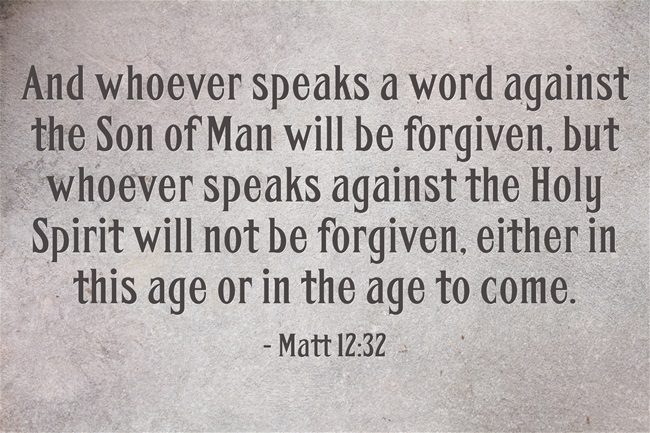Is there a sin that God will not forgive or an unforgivable sin?
The Law and Sin
Perhaps the first question that should be asked is “What is sin?” Does the Bible give us a precise idea on what sin is? Yes, because if you look at the Ten Commandments, we know from the beginning that murder is sin, so is theft, and adultery. It’s not that these commandments are “Don’t do this” and “Don’t do that,” but rather, “Don’t do this and hurt yourself and others” because that’s what sin does. It brings death (Rom 6:23). God’s Word says that “sin is lawlessness” (1st John 3:4), so sin is breaking God’s law which is not committing adultery, stealing, or take the life of another human being, but Jesus amped up those commands to even if we hate our brother or sister, He says it is murder of the heart (Matt 5:22). Jesus never came to do away with the law, but to fulfill the law (Matt 5:17), and He said, “whoever relaxes one of the least of these commandments and teaches others to do the same will be called least in the kingdom of heaven, but whoever does them and teaches them will be called great in the kingdom of heaven” (Matt 5:19). The law Jesus was speaking about was not the Mosaic Law which Jesus’ life, death, and resurrection superseded and made null. Those laws were only a shadow of the coming reality of the work of Christ at Calvary during the Passion (Heb 10:1-2). With the reality in Jesus Christ, the shadow is no longer needed or necessary.
Forgiveness
The Apostle Peter asked Jesus, “Lord, how often will my brother sin against me, and I forgive him? As many as seven times” (Matt 18:21)? That was more than the Jews would typically do as they would forgive someone up to three times, but that was it, so Peter appears to be generous in his allowance for forgiveness of up to seven times. Jesus however shocks them all by saying, “I tell you, not just seven times, but seventy-seven times” (Matt 18:22)! The NASB does a better job at translating this by saying, “do not say to you, up to seven times, but up to seventy times seven.” Jesus wasn’t saying we keep count and when we reach 490 times, we’re done. This was generally understood by His audience to be ongoing and continuous forgiveness of others, because that’s what God does for us. The Apostle John wrote that “if we walk in the light, as he is in the light, we have fellowship with one another, and the blood of Jesus his Son cleanses us from all sin” (1st John 1:7), however, if you read this in the way in which it was written in the Greek, it would actually, “the blood of Jesus his Son keeps on cleansing us from all sin.” All who have trusted in Christ can come to the Father to ask for forgiveness for our recent sins. If we confess them, we know He cleanses us from all of our unrighteousness (1st John 1:9), however, “If we say we have no sin, we deceive ourselves, and the truth is not in us” (1st John 1:8). No one can be forgiven of something that they are not even aware of. That doesn’t mean we must remember every sin, but what I mean is if someone doesn’t even think they’re a sinner, that’s bad, because Jesus came to die for sinners, and the truth is, all have sinned (Rom 3:23), and not even one of us are good (Rom 3:10-12).
The Unforgivable Sin
The Pharisees accused Jesus of casting out demons by the power of demons shortly after He had cast out a demon from a man who was mute and blind. They told Jesus, “It is only by Beelzebul, the prince of demons, that this man casts out demons” (Matt 12:24), but even the logic of such an idea is ridiculous, for what kingdom that divides against itself remains (Matt 12:25b)? Notice to whom Jesus was speaking. It was not His disciples, but in fact, the Pharisees, because it says He knew what they were thinking (Matt 12:25a), so Jesus gives them one of the greatest warnings recorded in the New Testament by telling them, “every sin and blasphemy will be forgiven people, but the blasphemy against the Spirit will not be forgiven” (Matt 12:31). Had the Pharisees blasphemed the Holy Spirit when they accused Jesus of doing miracles by demonic power? Yes, but there was still time to be forgiven because they were still breathing. The thief on the cross believed just prior to dying, so even for the Pharisees, it wasn’t too late, and some of the Pharisees did later believe; some before His death and resurrection, and some after His resurrection. Jesus was clearly telling them that they had basically blasphemed the Holy Spirit by attributing good to a source of evil. This is why Jesus gave them some of the most sobering words recorded in the New Testament; “whoever speaks a word against the Son of Man will be forgiven, but whoever speaks against the Holy Spirit will not be forgiven, either in this age or in the age to come” (Mat 12:32).
Is This Sin Still Possible?
I don’t believe anyone who is worried about having committed the unpardonable or unforgiveable sin has committed it. There is one sin that is totally unforgivable to God, and since He never changes, this sin will never be forgiven, no matter what, and it’s the sin of rejecting Jesus Christ. Jesus said, “Whoever believes in the Son has eternal life [but] whoever does not obey the Son shall not see life, but the wrath of God remains on him” (John 3:36). Anyone that rejects faith in Christ, God says they are only storing up His wrath every single day. The Apostle Paul writes that it was “because of your hard and impenitent heart you are storing up wrath for yourself on the day of wrath when God’s righteous judgment will be revealed” (Rom 2:5), and then, “He will render to each one according to his works” (Rom 2:6), so “for those who are self-seeking and do not obey the truth, but obey unrighteousness, there will be wrath and fury” (Rom 2:8). There is no other way to be spared this wrath but than through repentance and faith, which means trusting in Jesus Christ (Acts 4:12).
Conclusion
If you think you’ve committed the unpardonable sin, may I suggest to you to seek God’s Word because that’s where you’ll find assurance. In the Book of 1st John, the Apostle wrote extensively about our salvation, and in doing so, the word “know” appears 32 times! That means he wants us to know. One way of knowing is how we treat others, because John writes, “We know that we have passed out of death into life, because we love the brothers. Whoever does not love abides in death” (1st John 3:14), and it is “by this we know that we have come to know him, if we keep his commandments” (1st John 2:3), including loving God and our neighbor. If you still feel you’ve committed the unpardonable or unforgiveable sin, I would seek Godly counsel, but begin in the Word of God and stay in the Word of God, because it is as the Apostle Peter said to Jesus, after many of His disciples left Him and followed Him no more (John 6:66), “Lord, to whom shall we go? You have the words of eternal life, and we have believed, and have come to know, that you are the Holy One of God” (John 6:68-69).
Article by Jack Wellman
Jack Wellman is Pastor of the Mulvane Brethren Church in Mulvane Kansas. Jack is also the Senior Writer at What Christians Want To Know whose mission is to equip, encourage, and energize Christians and to address questions about the believer’s daily walk with God and the Bible. You can follow Jack on Google Plus or check out his book Teaching Children the Gospel available on Amazon.















